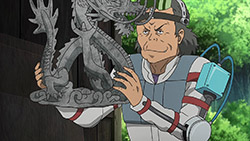 |
 |
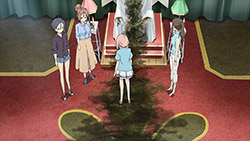 |
 |
 |
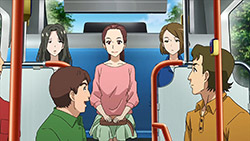 |
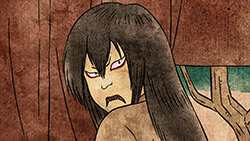 |
 |
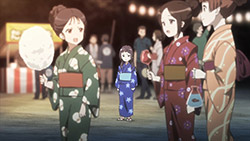 |
 |
 |
 |
 |
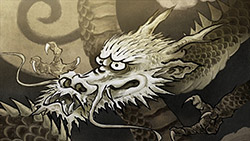 |
 |
 |
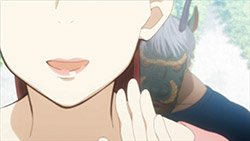 |
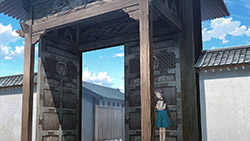 |
 |
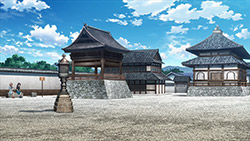 |
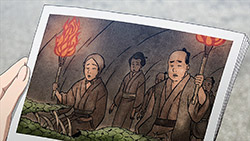 |
 |
 |
 |
 |
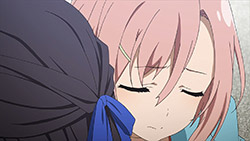 |
 |
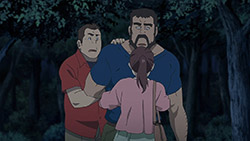 |
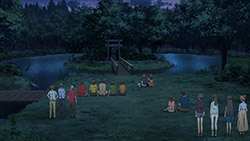 |
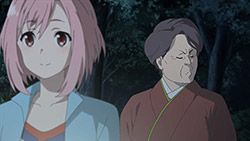 |
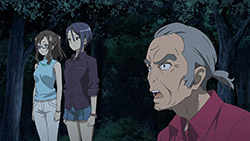 |
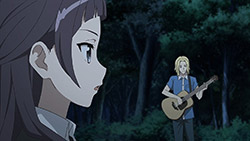 |
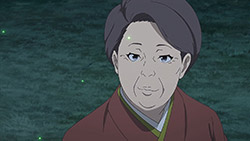 |
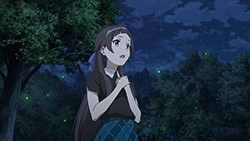 |
 |
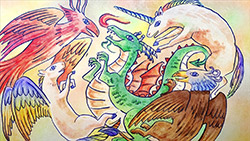 |
「忘却のレクイエム」 (Boukyaku no Rekuiemu)
“The Forgotten Requiem”
Manoyama’s lost legend about the dragon was a poignant way of seeing the show from Ririko’s perspective, and lends itself to the overarching theme of opening up to outsiders to prosper together. Both sides of the dragon story provide two elements that resonated with her; the current version of the story where the dragon is driven into a cave by the villagers who shunned her for being different, and the original version where the dragon was fearful of the villagers who unintentionally scared her by welcoming her into Manoyama as a guest.
The episode tells the two sides through Ririko’s personal experiences as she is cast away and embraced for being herself. Her desire to hide away from others due to the fear of societal rejection comes out in full-force once an obnoxious redshirt who considers her to be a nuisance for her obsession with the occult. However, as she learns about the true meaning of the dragon story, Yoshino reels Ririko back in by admiring the passion she brings to her research. It was ideal for Ririko’s episodes to flesh out her character through this story because she isn’t an open book. There is still unfinished information that is still being discovered about who she is, and how she should live her life. While the other girls can draw from their past experiences, Ririko only finds the pain of isolation, and would find solace in finding a story that mirrors the tragic misunderstanding that drew her further away from interaction. For Ririko to perform the long lost song is her method of letting down her walls to accept letting people into her life again, and showing Chitose how much she has improved ever since she started volunteering with Yoshino. The matchmaking service even inspires Ririko to come up with a way to help the agency see that town as a terrific wedding destination after everything is said and done. The episode was a great start to seeing a Ririko who isn’t as withdrawn as she used to be, and maybe a kinder Chitose.
The dragon story also reflects on the the encompassing theme of embracing new people and concepts that can reinvent tradition to breathe new life into the town. Many of the deeply traditional characters like Chitose are superstitious about the dragon’s curse, but also have their reasons for not approving of any one outside of the city. Because of this, it makes it all the more poetic when Sandal, whose great grandmother was from Manoyama, was the key to finding the original song that the villagers sang to the dragon, welcoming it to their town. The rediscovery of the dragon’s song through the lullaby Sandal remembers from his youth lends itself to the idea that input from outsiders like him and Yoshino aren’t aiming to destroy tradition, but rather recollect the town’s culture to help the village find itself once more.
Preview
 |
 |
 |

What a good episode. Toward the end it was easy to predict what was gonna happen, but I wouldn’t have had it any other way.
One-eighth.
So it just so happens that Riri can sing? 😀 I found it a bit odd that Yoshino put her in that situation when Riri showed no previous evidence that she had good singing skills. What if she sung poorly?? 😀
Perhaps she volunteered? Recall that she inexplicably volunteered as a stand-in for the missing actress in a peevious episode, in spite of her social anxiety. So it’s not entirely unprecedented.
I just hope there will be episodes about Sandal-san in the future. He’s so interesting.
Ohh yeah mah ship MAH SHIP MAH SHIP MAH SHIP!!!
MAH SHIP is teased there.
MAH RIRI X SANDAL FTW
That was a good and very believable example of how traditions can change in the place of origin. And also on how some of the original traditions are actually kept alive by those that have left the place. Possibly kept alive because they have a slight longing of their home town. Having been an expat myself, I can say that perceptions of some traditions change depending on where we reside. Though I’m not sure if that’s still true after the internet era.
https://randomc.net/image/Sakura%20Quest/Sakura%20Quest%20-%2011%20-%2003.jpg
Did the ex cause that? He looks clean the next day. What time do public bath houses close? Hard to imagine taking a nap in that situation.
– traditions keep alive that have left the place
not only traditions, also the frozen time feeling. When they go living out side the Country, their memories of home are from their youth, and when they come back as adults, they get an shock that even time do not stop while they where away. Sure in an lonely village time can run slower then living in a city. But time stand still with your childhood memories. Do the returned want to turn back time or accept the time flow?
Can anyone here tell me the title of the song she sang???
God Ririko has a good singing voice, almost didnt sound like an anime voice. Good job seiyuu-san!
I am not sure if they have it out yet. As of now it’s just called “Sleep, Sleep Now”. I’m listening it over and over again on Youtube lol.
https://www.youtube.com/watch?v=T7R7lTO9T3Q
All the girls changed in some way or another but I think Riri really changed the most out of everyone. And I can relate to her so much about not feeling in place and always being alone. The song and the drawing by Sandal-san, it was too beautiful T^T
https://randomc.net/image/Sakura%20Quest/Sakura%20Quest%20-%2011%20-%2036.jpg